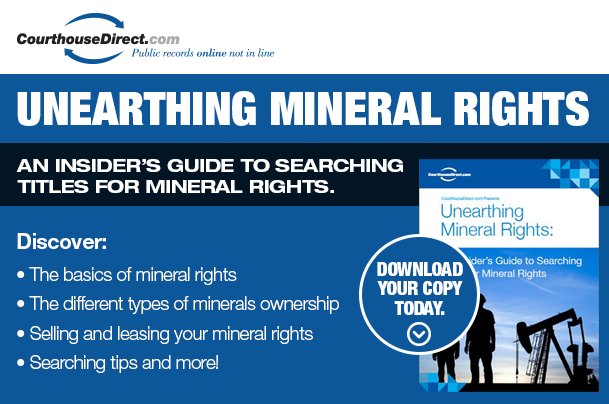 You have a piece of land that has been pretty good to you. Maybe it was good pastureland or grew terrific crops. Plus, it came with a bonus - you got a lucrative mineral lease from an oil or gas company that developed a productive well. Now you have royalties pouring in.
You have a piece of land that has been pretty good to you. Maybe it was good pastureland or grew terrific crops. Plus, it came with a bonus - you got a lucrative mineral lease from an oil or gas company that developed a productive well. Now you have royalties pouring in.
But what if you don’t want the land anymore? You’re trying to get out of the cattle business or farming. Or maybe the land isn’t worth much beyond its mineral deposits. Is it possible to sell your property and retain the mineral rights?
You betcha.
Mineral Rights vs. Surface Rights
In Texas and other states, particularly those rich in oil or gas, people came up with a way for you to kind of have your cake and eat it, too. It’s called severing the mineral rights from the surface rights. The concept is simple - two entities can own the same piece of property, yet not be partners.
Severing the surface rights from the mineral rights is a standard method of allowing someone to continue to enjoy the fruits of a mineral lease while selling surface land to someone else. In fact, this is how the oil and gas business has operated for over a century.
The difference between surface rights and mineral rights has to do with which part of the earth you own or lease.
- Surface rights refer to the ownership of anything found on the surface of the property. Physical buildings, trees, rocks, and dirt. Anything above ground is subject to your surface rights.
- Mineral rights almost always refer to oil and gas found beneath the surface of a property. In general, mineral rights are worth more than surface rights because you can lease the land beneath your property for mineral exploration and development while selling the surface or using it for something else.
- Mineral leases typically have implied use rights to part of the surface. The surface rights owner must allow reasonable access to the oil or gas company for exploration, drilling, and transportation of the product.
Severing the mineral rights from the surface makes sense all the way around. However, it might get a little tricky when it comes time to sell that surface property. The new owner needs to understand that there is a different entity working the same patch, in a way.
The Mineral Estate Is Dominant
In any case, whether the surface and mineral rights are severed or not, the law in Texas says the mineral estate is dominant. In other words, the owner of the mineral estate may use the surface estate freely to the extent needed to explore, develop, and produce oil and gas.
The mineral estate owner also is allowed to lease the mineral rights to an exploration and production company, which would then have the same implied right to use the surface as needed. The rules may be changed with specific clauses and terms of the lease or deed. This is the case in most municipalities where there are restrictions on oil and gas activity within the city jurisdiction.
The “accommodation doctrine” may also hold. It limits the circumstances in which the lessee must modify its operations to accommodate an existing surface use if there is a reasonable alternative.
Implied Use
What exactly does implied use mean?
In Texas, ownership of the mineral rights includes an implied right to use the surface property (also known as the surface estate) as is “reasonably necessary to explore, develop, drill, produce, market, transport, and store the minerals from the land."
The mineral estate owner or the lessee of the mineral rights (generally the oil or gas well operator) can access and use part of the surface for various reasons and activities.
- To enter the surface property that sits over the mineral lease.
- To explore for oil and gas with seismic vehicles or other methods of exploration.
- To construct roads, well sites, and pipelines serving the wells where the mineral owner wishes to put them.
- To dig pits for waste fluid handling and extract soil and clay to build the site up.
- To erect storage facilities and use groundwater for operations.
- To dispose of any saltwater through subsurface injection or disposal wells.
As you might imagine, this sort of activity could limit the buyers interested in your surface rights and property. That doesn't mean you can't sell the land after leasing the mineral rights to someone else.
The Effect of Mineral Lease Retention on Land Sales
Since the mineral lease is part of the disclosure for the property, your pool of potential buyers may shrink. There will be those who prefer to own both sets of rights themselves as well as those who think they would be living near a donkey engine.
If your surface property has highly desired features, you will find someone to buy it. You may need to reduce your asking price because part of the surface must be left for implied reasonable use. If you aren't in a hurry to unload the property, you may be able to get something close to what you want.
If, on the other hand, you are attempting a short sale, the mineral rights lease will reduce your leverage. If the short sale is meant to satisfy a lien or raise money fast, you won’t get as much as you would if the mineral rights went with it.
In decades past, many potential land buyers might not have thought anything about severed mineral rights, but recent discoveries and changes in drilling and production have brought the issue out into the open. Property owners and buyers pay closer attention than they used to.
Less to do with a mineral lease, if it’s a buyer’s market, your property won’t move very quickly either, not will you be able to sell for as much as you would like.
Requirements for Selling Surface Property
The reservation of mineral rights must be stated in the deed as well as the sales contract. If you deeded those rights to someone else, that must be declared as well. Without clear statements of mineral rights ownership, the title becomes clouded. Future owners will be required to seek a quitclaim deed from the mineral rights owner before the land can be transferred to someone else.
Can you sell your property if you have leased the mineral rights? Yes. Will it be easy? Maybe so, or maybe not. However, in Texas and a few other states, you do have the option of severing the mineral estate from the surface estate and retaining the rights to only one of them.























